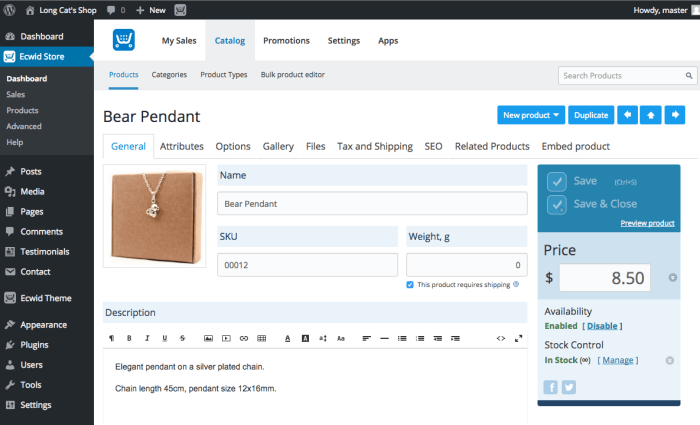WordPress for e-commerce opens the door to a thriving online marketplace, catering to the ever-growing demand for digital shopping solutions. With its user-friendly interface and extensive customization options, WordPress has established itself as a leading platform for entrepreneurs and businesses aiming to sell products online. Its robust features are specifically designed to facilitate e-commerce, making it easier than ever for anyone to set up their online store and reach a global audience.
As the landscape of retail continues to evolve with the rise of online shopping, WordPress provides the tools necessary to create a seamless shopping experience. From setting up an attractive storefront to managing products and implementing effective marketing strategies, WordPress empowers users to take full control of their e-commerce journey.
Introduction to WordPress for E-commerce
WordPress has established itself as a dominant force in the e-commerce landscape, providing users with the tools necessary to create, manage, and grow their online businesses. As online shopping continues to surge, the significance of platforms like WordPress cannot be overstated.
The rise of e-commerce has transformed how consumers shop, with a growing number of purchases made online. WordPress plays a pivotal role in this transition by offering a flexible content management system that caters to the needs of online retailers. This platform is not just user-friendly; it also boasts a plethora of features that make it an ideal choice for e-commerce. From customizable themes to powerful plugins, WordPress equips entrepreneurs with everything they need for a successful digital storefront.
Setting Up a WordPress E-commerce Site
Establishing a WordPress e-commerce site involves a systematic approach that ensures a solid foundation for your online store.
To begin, follow these steps to install WordPress for e-commerce:
- Select a hosting provider that supports WordPress installations.
- Choose a domain name that reflects your brand.
- Install WordPress through the hosting provider’s control panel.
- Access the WordPress dashboard to configure basic settings.
Selecting a suitable e-commerce theme is crucial for your store’s success. Look for themes that are responsive, -friendly, and compatible with essential plugins.
Essential plugins for e-commerce functionality include:
- WooCommerce: The leading e-commerce plugin that adds essential features.
- Yoast : A tool that helps optimize your website for search engines.
- Jetpack: A comprehensive plugin for security, performance, and marketing.
- WPForms: A user-friendly form builder for creating surveys and contact forms.
Customizing Your E-commerce Store, WordPress for e-commerce
Designing an appealing product page is essential for converting visitors into customers. Focus on high-quality images, compelling product descriptions, and clear calls to action to enhance engagement.
Optimizing the checkout process is another critical aspect of user experience. Streamlined checkout can significantly reduce cart abandonment rates. Implement features like guest checkout, auto-fill forms, and multiple payment options to simplify the process.
Integrating payment gateways effectively ensures secure transactions. Popular options include PayPal, Stripe, and Square, which provide both security and convenience for customers.
Managing Products and Inventory

Adding and managing products in WordPress is straightforward with the WooCommerce plugin. Users can easily add descriptions, images, prices, and variations for each product.
Setting up product categories and tags helps organize products and improve navigation. This structured approach enhances the shopping experience and aids customers in finding what they need quickly.
For inventory management, leveraging WordPress plugins can streamline the process. Plugins like Stock Manager for WooCommerce or WooCommerce Inventory Management provide features for tracking stock levels, managing backorders, and generating inventory reports.
Marketing and Promoting Your E-commerce Site
Utilizing social media platforms is a powerful way to promote your WordPress e-commerce store. Share engaging content, run targeted ads, and interact with followers to build a community around your brand.
Email marketing techniques tailored for online shops can also boost sales. Create segmented lists to send personalized offers and product recommendations to increase engagement and conversion rates.
best practices are vital for driving organic traffic to your WordPress e-commerce site. Focus on optimization, meta descriptions, and creating high-quality content to improve search visibility.
Ensuring Security for Your E-commerce Store

Implementing key security measures is essential to protect a WordPress e-commerce website from potential threats. Regular updates for themes and plugins, along with strong passwords, can significantly reduce vulnerabilities.
The importance of regular backups cannot be overstated. Utilize backup plugins to automatically save your site’s data, ensuring you can easily restore your site in case of an emergency.
SSL certificates play a pivotal role in securing data during transactions. They encrypt sensitive information, enhancing customer trust and ensuring secure payment processes.
Analyzing Performance and User Experience

Tracking user behavior on a WordPress e-commerce site is crucial for understanding customer preferences and improving conversion rates. Tools like Google Analytics can provide insight into user journeys, bounce rates, and engagement levels.
Monitoring site performance and speed is equally important. Utilize tools such as GTmetrix or Pingdom to analyze load times and identify areas for improvement.
Improving overall user experience based on analytics involves making data-driven decisions. Regularly assess and adjust your website layout, product placements, and navigation paths to better meet user needs and expectations.
Concluding Remarks
In conclusion, leveraging WordPress for e-commerce not only simplifies the process of building an online store but also equips users with essential strategies to enhance their business’s visibility and security. By understanding the core functionalities of WordPress, entrepreneurs can create captivating shopping experiences that attract and retain customers. As you embark on this journey, remember that the right tools and knowledge can pave the way for e-commerce success.
